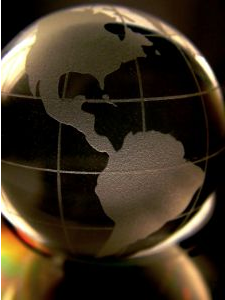Free Trade and Economists
by William Chiu For over 200 years, economists have advocated free trade. And for over 200 years, economists have come under attack for defending a practice that is accused of benefiting the richest of the rich and hurting the poorest of the poor. When Harvard economist Greg Mankiw wrote that outsourcing would probably be net beneficial for the United States in the long run (Source: Economic Report of the President, 2004), he was greeted with disapproval from both Republicans and Democrats.
For over 200 years, economists have advocated free trade. And for over 200 years, economists have come under attack for defending a practice that is accused of benefiting the richest of the rich and hurting the poorest of the poor. When Harvard economist Greg Mankiw wrote that outsourcing would probably be net beneficial for the United States in the long run (Source: Economic Report of the President, 2004), he was greeted with disapproval from both Republicans and Democrats.And the arguments against free trade are not limited to the political arena. Journalism has also taken a position against free trade. PBS's Frontline has argued that Wal-Mart sells out American jobs by forcing U.S. manufacturers to abandon U.S. factories and set up shop in China in the pursuit of lower prices and higher profits. CNN's Lou Dobbs Tonight portrays free trade as a war against the middle class. The communication gap between economists and non-economists leaves economists fending off critics of free trade from the left and the right.
William Poole, president of the Federal Reserve Bank of St. Louis, offered his thoughts on the communication gap in a 2004 speech to the Trade, Globalization and Outsourcing Conference. Poole argued that people do not see the full benefits of free trade because they do not understand the interactions and connections across multiple markets in the economy. As a result, the public tends to overemphasize the costs of free trade and underemphasize its benefits. He concludes that the media should report trade issues in a fair and balanced manner that requires three sections in every story: who gains, who loses, and what are the net gains to the country.
However, is resorting to the "net gains" argument sufficient to persuade the general public of the benefits of free trade? Perhaps not. Even if net gains are positive, the benefits of free trade are generally dispersed among the population as whole, while the costs of free trade are concentrated among the few. When news reporters want to find the drawbacks of free trade, they know exactly where to go and whom to interview. Empty car factories in Detroit, Michigan and disgruntled workers in Circleville, Ohio leave lasting impressions on the typical voter. The benefits of free trade come in as lower prices at the store. At first glance, $50 off the price of a TV hardly seems worth firing 5,000 TV-factory workers. However, policy should be made on the basis of aggregate cost-benefit analysis rather than the welfare of a few. Suppose those 5,000 workers each lose $50,000 in annual income due to the outsourcing of TV manufacturing jobs to China; and suppose that 20 million U.S. consumers buy TVs each year.
Net Benefit to Trade = ($50 x 20,000,000) - ($50,000 x 5,000)
Net Benefit to Trade = $750,000,000 per year
Critics would emphasize that a worker who loses her job to outsourcing loses "$50,000 per year," while the average consumer only gains by "$50 per TV." But remember that in aggregate terms, the cost savings greatly outweigh the wages lost. Hence, free trade benefits America more than it hurts. And in the long run, those 5,000 workers would be reemployed in more profitable industries. However, the transition from a TV-factory job to another industry is a difficult one that will require time and hard work. The federal government offers trade adjustment assistance to workers in need of new skills. Economists could probably earn more "morality points" by advocating a more generous trade assistance program.
Discussion Questions
1. Critics of free trade often point to the disparity in wages between the U.S. and China. Some go so far as to say that outsourcing exploits foreign workers. If U.S. firms did not have factories in China, would Chinese workers be better or worse off?
2. Economic prosperity is often correlated with pro-Western ideology. Why would the U.S. have an interest in signing a free-trade pact with Peru?
3. Some people obviously benefit more from free trade than others. How can winners from trade compensate the losers? What role should the government play?
Labels: Free Trade



0 Comments:
Post a Comment
<< Home